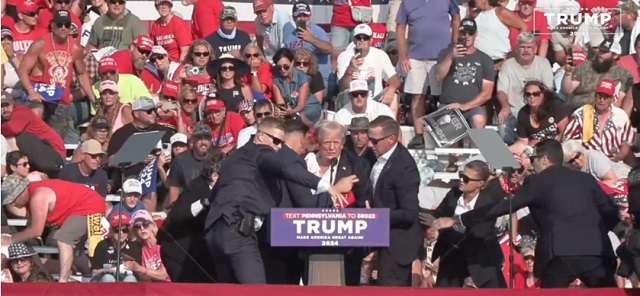conflict
Putin tells Tucker it would have been ‘culpable negligence’ for Russia to not intervene in Ukraine
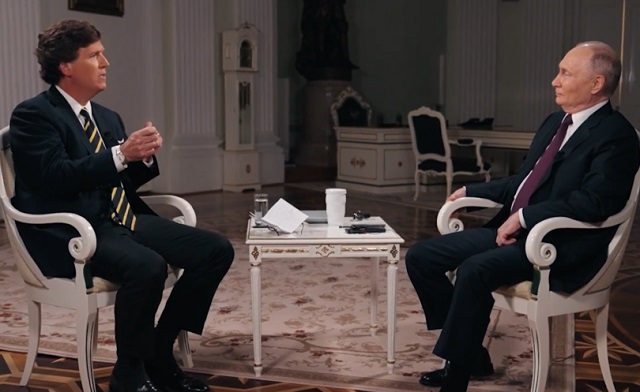
From LifeSiteNews
‘When did the developments in Ukraine start? Since the coup d’etat and the hostilities in Donbas began. That’s when they started. And we were protecting our people, ourselves, our homeland and our future,’ the Russian president said.
In a much-anticipated interview with popular commentator Tucker Carlson, Russian President Vladimir Putin discussed his motivations behind invading Ukraine two years ago, the many decisions the United States and their partners made to provoke the war, the CIA’s ability to disregard the policy of U.S. presidents, and the notion that Russia intends to invade Western Europe as obviously “imaginary.”
After a long, detailed presentation on the history of the region and the immediate run-up to Russia’s February 24, 2022, invasion of Ukraine, Putin made the case for how the U.S. broke its verbal commitment to expand NATO eastward after the collapse of the Soviet Union. With five waves of expansion, this came to a critical point at the 2008 NATO summit in Bucharest that declared the alliance’s intention to welcome Ukraine and Georgia despite the Bush administration having a clear understanding this could set the stage for war with Russia.
Ep. 73 The Vladimir Putin Interview pic.twitter.com/67YuZRkfLL
— Tucker Carlson (@TuckerCarlson) February 8, 2024
He also described the process behind the 2014 coup d’etat of the democratically elected government in Ukraine as being orchestrated by the CIA to facilitate the utilization of this nation as a springboard of aggression against the Russian motherland. This included the government of Kiev’s war against native Russians within their own borders in the east.
READ: ‘Monumental provocation’: How US and international policy-makers deliberately baited Putin to war
“So, in 2008, the doors of NATO were opened for Ukraine. In 2014, there was a coup (and) they started persecuting those who did not accept the coup,” Putin said. “They created the threat to Crimea, which we had to take under our protection. They launched the war in Donbas in 2014 with the use of aircraft and artillery against civilians. This is when it all started.”
“They launched a large-scale military operation. Then another one. When they failed, they started to prepare the next one. All this against the background of military development of this territory and opening of NATO’s doors.”
“How could we not express concern over what was happening? From our side this would have been a culpable negligence,” he said. “It’s just that the U.S. political leadership pushed us to the line we could not cross because doing so could have ruined Russia itself. Besides, we could not leave our brothers in faith, in fact, a part of Russian people, in the face of this war machine.”
He recalled the efforts to bring about a peace agreement in April of that year in Istanbul, Turkey. Stating they had a deal agreed upon, including Ukraine’s “de-nazification” of their nation, he was told by European officials that he had to “create conditions for the final signing of the documents.”
“My counterparts in France, in Germany said, ‘How can you imagine them signing a treaty with a gun to their heads?” demanding he pull back troops from Kiev, the Russian president explained. “As soon as we pulled back our troops from Kiev, our Ukrainian negotiators immediately threw all our agreements reached in Istanbul into the bin and got prepared for a longstanding armed confrontation with the help of the United States and its satellites in Europe.”
He explained the real presence of Nazi ideology in Ukraine and elsewhere, which strikes a prominent chord in the memory of the Russian people due to Hitler’s atrocities against them and others during World War II.
Asked about the notion stated in the U.S. and elsewhere that Russia is aggressive and plans to expand its territories west to Poland and other nations, Putin said, “They’re trying to intimidate their own population with an imaginary Russian threat. This is an obvious fact. And thinking people, not Philistines, but thinking people, analysts, those who are engaged in real politics, just smart people, understand perfectly well that this is a fake. They’re trying to fuel the Russian threat.”
This statement is supported by prominent political science scholar and author Dr. John Mearsheimer, who observed in a 2015 lecture that “there is no evidence that (the United States) thought Putin was aggressive before the (2014 coup) crisis. There’s no evidence that we were talking about expanding NATO because we had to contain the Russians.”
“What happened here was that after the crisis broke out on February 22nd, we then decided that Russia was aggressive. We then decided that Russia was bent on creating a Greater Russia. It was after the fact,” the best-selling author explained.
Putin went on to address “the war of propaganda,” telling Carlson “it is very difficult to defeat the United States because the United States controls all the world’s media and many European media.”
Regarding the falling U.S. dollar, Putin explained that “to use the dollar as a tool of foreign policy struggle is one of the biggest strategic mistakes made by the U.S. political leadership. The dollar is the cornerstone of the United States power… As soon as the political leadership decided to use the U.S. dollar as a tool of political struggle, a blow was dealt to this American power.”
The Russian president also stated that despite all the sanctions and restrictions utilized against his nation, “Russia was the first economy in Europe last year,” the fifth largest economy in the world.
He complained about aggressive Western policy toward Russia since the fall of the Soviet Union and discussed Ukrainian president Volodymyr Zelensky deceiving his voters by embracing a hardline policy against Russia after campaigning that he would bring about peace.
Putin also mentioned famous literary giant “Dostoyevsky, who was very well known in the West” and who spoke much “about the Russian soul.”
“Everyone in the West thinks that the Russian people have been split by hostilities forever, and now they will be reunited. The unity is still there,” he exclaimed. “Why are the Ukrainian authorities dismantling the Ukrainian Orthodox Church? Because it brings together not only the territory, it brings together our souls. No one will be able to separate the soul.”
conflict
Communist China makes shocking number of crucial US military equipment components: report
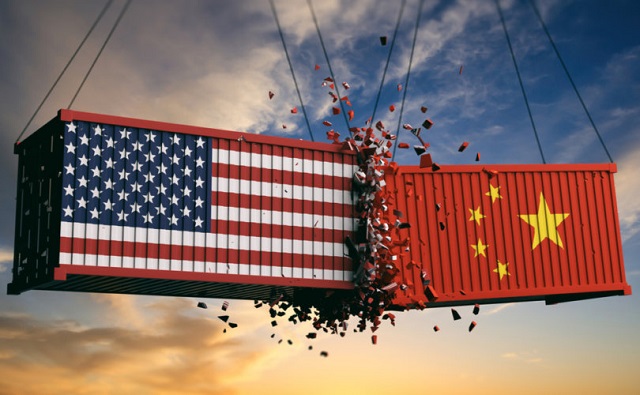
From LifeSiteNews
From 2005 to 2023, Chinese manufacturers in the U.S. supply chain have grown from around 12,000 to almost 45,000.
A new report details how deep the People’s Republic of China has embedded itself within the U.S. supply chain, especially for military machinery. While U.S. lawmakers have been calling for an end to this for some years, China’s domination continues unabated.
According to the report, China’s presence in the U.S. supply chain has been steadily rising for the better part of almost 20 years. From 2005 to 2023, Chinese manufacturers in the U.S. supply chain have grown from around 12,000 to almost 45,000.
The use of forced labor and dangerous working conditions gives China the ability to quickly churn out products, while keeping cost savings at a premium.
Between 2014 and 2023, the data presents a concerning trend of China outpacing U.S. supply chains across almost all industries, by 1,800 percent in some instances – including electronics, transportation, materials and chemicals, and industrial equipment.
A large number of Chinese semiconductors are used in critical military platforms, accounting for around 40 percent of all U.S. Department of Defense weapons systems and infrastructure, and are further linked to military supply chains such as Patriot air-defense missiles and B-2 bombers.
For example, a Lockheed Martin missile factory situated in Alabama produces Javelin anti-tank weapons which use more than 200 semiconductors in each weapon. This equates to thousands of Chinese-made semiconductors within U.S. weaponry.
“U.S. companies at the bottom of the supply chain pyramid often source these parts from China in open market transactions. As a result, many essential components in sensitive U.S. military systems now come from China. Countless major weapons platforms are vulnerable,” the report states.
U.S. air-launched armament supply chains also relied heavily on Chinese suppliers in 2023, according to the data. Long range anti-ship missiles, joint air-to-surface standoff missiles, naval strike missiles, Tomahawk cruise missiles, and Harpoon anti-ship missiles all used Chinese made components.
The report notes China now has a larger naval force than the U.S., with 340 new warships, and is on track to reach 400 by 2025, and 440 by 2030. Currently, U.S. Navy has under 300 warships.
Furthermore, China tops the U.S. in shipbuilding capabilities, with 17 naval shipyards in China having the ability to produce new warships, compared with five naval shipyards in the U.S.
To alleviate this, the report points out the U.S. could use its allies – which would include Japan and South Korea – to open shipyards to assist with ship production, bringing vital technology and techniques with them. However, the report states the U.S. government is reluctant to invest more funding into ship manufacturing.
Some state leaders are fighting back against this trend. In January, Florida Gov. Ron DeSantis announced the Sunshine State will invest over $380 million into semiconductor manufacturing. Over $100 million will be focused on developing Florida’s semiconductor “talent-pipeline” with significant investment into state colleges and universities, including the University of Florida’s Semiconductor Institute.
“Industries like semiconductor manufacturing and advanced packaging support our national security and create economic opportunities in our state,” DeSantis said in a statement from his office.
WND contacted GOP members of the Committee on Homeland Security and Governmental Affairs about the report on Chinese made military components, but did not receive a response at the time of publishing.
Reprinted with permission from the WND News Center.
conflict
Boris Johnson lobbies Trump at RNC to back down from peace talks on Ukraine
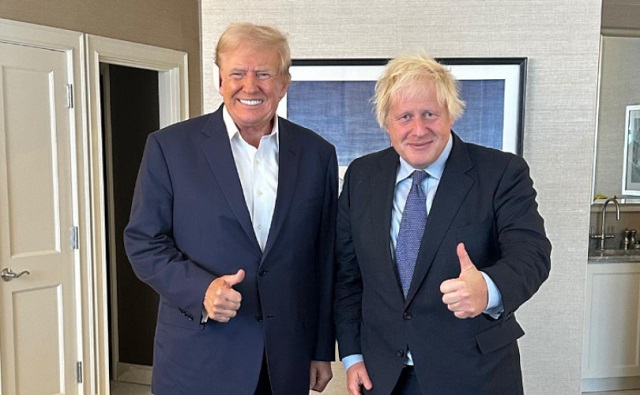
From LifeSiteNews
By Frank Wright
The former U.K. Prime Minister Boris Johnson made a flying visit to the Republican National Conference this week, in a mission to persuade Donald Trump to continue the war in Ukraine.
Great to meet President Trump who is on top form after the shameful attempt on his life. We discussed Ukraine and I have no doubt that he will be strong and decisive in supporting that country and defending democracy. pic.twitter.com/OEVZPZsRE1
— Boris Johnson (@BorisJohnson) July 16, 2024
With Trump, his vice president pick JD Vance, and even Senator Lindsey Graham calling for an end to the proxy war against Russia, Johnson is making a second attempt to sabotage a realistic peace in Ukraine.
Johnson’s war record
Boris Johnson has used the war in Ukraine to cement a legacy for himself as a sort of latter-day Winston Churchill. Mere weeks after Russia’s invasion, he made another flying visit – this time to Kiev.
The reason for his unscheduled arrival in the office of the then-elected President Volodymyr Zelensky was that a peace deal had been agreed between Ukraine and Russia.
Brokered in Istanbul, Turkey, its existence was confirmed by former Israeli Prime Minister Naftali Bennett, who was party to the negotiations.
It was Johnson who urged Zelensky to throw this peace deal in the garbage, giving assurances that the U.K., U.S., NATO, and the EU would back Ukraine to victory in the war instead.
That deal seems impossibly attractive now. Russia would have kept only the strongly Russian-attracted Crimea, the two other Russian-speaking Donbass sections of Donetsk and Lugansk would have been made autonomous regions within Ukraine, and Ukraine would simply have had to agree to abandon any plans to join NATO.
That would have completely ended the credibility of Ukrainian and Western propaganda that Russia was planning to conquer Ukraine and then further expand its empire into more of the former Soviet Empire slave states.
However peace comes now, it is unlikely to be agreed on the generous terms rejected by the sudden, last-minute intervention by Boris Johnson, who hosted the neo-Nazi Azov battalion in the U.K. Parliament in May. It is a strange “Churchill” indeed who waves a flag inspired by the Waffen-SS.
450,000 British died during WW2 to defeat Nazi Germany. This week Boris Johnson welcomed the Ukrainian neo-Nazi Azov Battalion as “heroes” in London. No respect for those who died to stop the Nazi ideology. Now the UK Govt is using Nazis to kill Russians. pic.twitter.com/4tMq7N8npr
— Kim Dotcom (@KimDotcom) May 24, 2024
Ukraine – ‘functionally destroyed’
Johnson is responsible instead for a policy which has seen Ukraine “functionally destroyed as a country,” as JD Vance said in December 2023. The likely future U.S. vice president noted the terrible losses and declining population of Ukraine, saying, “The average age of a soldier in the Ukrainian army right now is 43.”
Pointing out the futility of continuing to send money to Ukraine, Vance sensibly asked, “What is 61 billion dollars [more] going to accomplish that a hundred billion hasn’t?”
His announcement as Trump’s VP pick, along with Trump’s miraculous survival of Saturday’s assassination attempt, has proven doubly alarming to all those whose futures are staked on that of Project Ukraine.
The end times
There can be no surer sign of the end times – whether for Ukraine or more generally – than career warmonger Lindsey Graham calling for peace.
In remarks which will likely ruin Boris Johnson’s day, Politico reported on July 17 that the childless senator had begun to echo the Trump/Vance line to stop the war in Ukraine.
“I want to end this war in Ukraine, and it’s going to be a diplomatic solution,” said Graham, adding “it’s going to take a guy like President Trump to bring this war to an end honorably.”
Graham echoed the emerging, if limited, realist viewpoint of Trump and Vance, repeating the charge that neither NATO nor Europe have been meeting the costs of their own security arrangement.
That has been paid for by the U.S., and according to Graham, that too must end. “NATO needs to pay more,” he said, recalling Vance’s speech in April in which he charged Europe of “failing to stand on its own two feet.”
The massive cost of providing the security umbrella through NATO to Europe is one reason for a revision of U.S.-European security policy. Downstream of this is the urgent need for Europe – including the U.K. – to rediscover the art of diplomacy.
Politicians such as Boris Johnson face humiliation in any peace deal with the Russians. The German and French leadership, and that of the EU itself together with many member nations, have all been totally committed to humiliating, weakening, and breaking up Russia, the regime change removal of its president, and the total victory of Ukraine. None of these goals were ever remotely realistic.
The German government has sought to criminalize the anti-war AfD, which was the second most popular party in Germany in the recent EU elections.
READ: Germany’s vice chancellor refuses to rule out criminalizing anti-globalist AfD party
Its finance minister Robert Habeck admitted, amidst a domestic financial crisis, that he had sent all the money to Ukraine.
The German government faces collapse, following years of "wrong policies" which amount to national suicide. As German farmers blockade supermarket supply chains, one AfD member asked – "Where has the money gone?" Habeck's answer "To Ukraine". Read more:https://t.co/jNtz818NNP
— Frank Wright (@frankwrighter) January 19, 2024
France’s Emmanuel Macron has made reckless statements promising to send French troops to fight Russia, and the outgoing foreign minister of the U.K. David Cameron privately admitted in late June that the British pro-Ukraine war position was “fixed” and would not change with the election of a Labour government.
UK Foreign Secretary David Cameron reveals all about the permanent pro-war Ukraine policy of Britain – to pranksters Lexus and Vovan.
For Cameron, hope lies with people like thanaterotic homosexual death cult leader Lindsey Graham – who wants to bomb Moscow. https://t.co/YmURbn8wBR
— Frank Wright (@frankwrighter) June 26, 2024
Cameron was right. It has not changed. On July 10 it was reported that the new Labour Prime Minister Keir Starmer has promised Ukraine £3 billion a year ($3.88 billion) “for as long as it takes.”
EU Chief Commissioner Ursula von der Leyen has consistently called for the ousting of Valdimir Putin and for the war to continue. She famously stated in September 2022 that “Putin will fail and Ukraine and Europe will prevail.”
Staking the political future of Europe on the impossible goal of Ukrainian victory was a reckless and unforced error, which lent an air of gravitas to a political class bereft of sane initiative.
The EU has recently selected a second pantsuited militant as its chief diplomat. Kaja Kallas, former leader of the tiny Baltic state of Estonia, called for the breakup of Russia mere weeks ago, and pledged support for “Ukraine’s victory” at last week’s NATO summit.
Europe has lost the art of diplomacy, and its leaders stand to lose all credibility as their Ukrainian war ends. This war made them appear serious, albeit serious about a delusion which promised only more death, and the dangerous potential of escalation to all out nuclear war.
To be faced with reality for these people is to be faced with political extinction. Relations with Russia will be normalized, as in the real world neither Russia nor Europe can hope for much of a future in the absence of resumed diplomatic and energy links.
It seems strange to say it, but these are strange times. The political leadership of pro-Ukraine Europe is fighting for its life to prolong a war that will risk the lives of everyone else. It is implacably opposed to peace, as this means political suicide.
Like their counterpart in Israel, Benjamin Netanyahu, these are politicians for whom peace spells doom. It is for this reason they will do anything in their power to prevent peace breaking out.
-
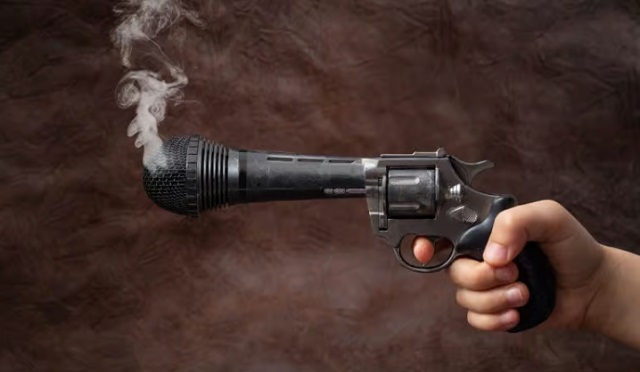
 Brownstone Institute1 day ago
Brownstone Institute1 day agoThe Media Refuses to Accept Covid Reality
-
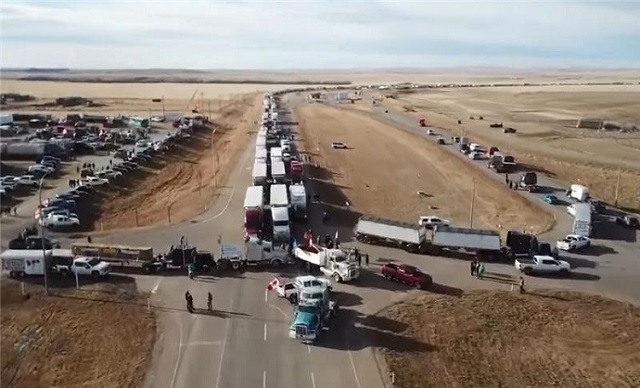
 Alberta1 day ago
Alberta1 day ago‘Fireworks’ As Defence Opens Case In Coutts Two Trial
-

 National1 day ago
National1 day agoLiberals offer no response as Conservative MP calls Trudeau a ‘liar’ for an hour straight
-
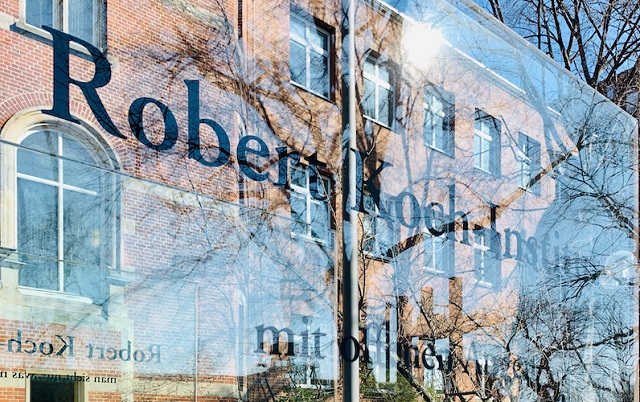
 COVID-191 day ago
COVID-191 day agoLeaked documents: German gov’t lied about shots preventing COVID, knew lockdowns did more harm than good
-

 Business1 day ago
Business1 day agoFederal government seems committed to killing investment in Canada
-

 International1 day ago
International1 day agoSwitzerland’s new portable suicide ‘pod’ set to claim its first life ‘soon’
-

 Business1 day ago
Business1 day agoEstonia’s solution to Canada’s stagnating economic growth
-
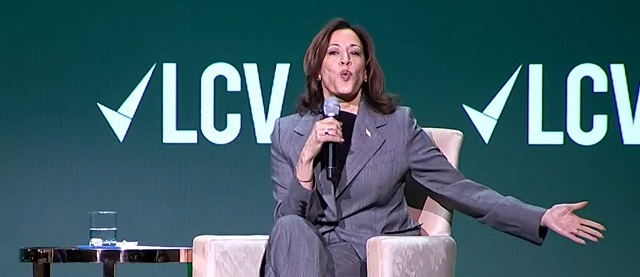
 Economy1 day ago
Economy1 day agoKamala Harris’ Energy Policy Catalog Is Full Of Whoppers



